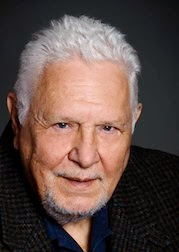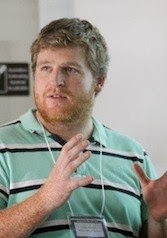
In recent decades, cosmologists have investigated the ‘fine-tuning’ of a number of physical laws and values that determine the structure and nature of our universe. It appears that these parameters have to be very carefully selected for our universe to survive and for intelligent life to evolve.
This scientific conclusions has been used to argue for the existence of God, so when two expert scientists strongly disagree, the stakes are high.
The protagonists

Victor Stenger is a semi-retired US particle physicist (formerly of the University of Hawaii), an author and a committed atheist. He has written a dozen books on science and religion, and has taken an interest in the fine-tuning question.
Of particular interest are his papers Intelligent Design and The Anthropic Principle, a computer simulation, MonkeyGod and the book The Fallacy of Fine-Tuning.

Luke Barnes is a postdoctoral researcher in astrophysics at the University of Sydney, having previously studied at Cambridge and worked in Switzerland.
He has taken considerable interest in the question of fine-tuning. On his blog, Letters to Nature, he has evaluated and critiqued the views of theists such as William Lane Craig and Hugh Ross, and atheists such as Lawrence Krauss and PZ Myers – and Stenger.
Claim and counter claim
Stenger claimed in the book that fine-tuning is a fallacy. “The most commonly cited examples of apparent fine-tuning can be readily explained ….. Plausible natural explanations can be found for those parameters that are most crucial for life”
Barnes argued in a comprehensive paper later published in a reputable peer-reviewed journal (Publications of the Astronomical Society of Australia, 29, 4, pp. 529) that Stenger had got most of the science wrong in both his book and the MonkeyGod simulation. He concludes his review of the fine-tuning literature with:
the universe is fine-tuned for the existence of life. Of all the ways that the laws of nature, constants of physics and initial conditions of the universe could have been, only a very small subset permits the existence of intelligent life
Stenger responded with a brief (12 pages) paper which claims Barnes has misunderstood and misrepresented him, does not invalidate any of the book, which is in agreement with the literature.
Finally Barnes replied with a further critique, concluding that Stenger had failed in his objectives, and was clearly out of step with the science, quoting 7 of the world’s top cosmologists to illustrate.
Who’s right?
It seems to me that Barnes’ case is far stronger than Stenger’s:
Expertise
Barnes works in the field and has peer-reviewed publications in cosmology, including his paper critiquing Stenger’s book. Stenger’s field is particle physics, which is relevant to only some of the cosmology, and I’m not aware of any peer-reviewed publications in cosmology. (He did prepare a paper but it hasn’t appeared.)
Depth of argument
I don’t have any competence in cosmology, but Barnes has argued his case with impressive rigour and copious references to current research. Stenger’s case is, on his own admission, aimed at a more popular level, and therefore he doesn’t really address the scientific evidence referenced by Barnes.
Scientific consensus
Stenger claims “no prominent physicist or cosmologist has disputed my basic conclusions”, and he has corresponded with several prominent cosmologists and obtained their response to two questions he put to them. But their replies don’t support Stenger’s claim that they agree with him – they clearly disagree about the science – and Stenger has had to re-interpret their comments to suit his purposes Note 1.
Barnes is discussing the science, not theistic arguments, and Stenger’s conclusions on the science disagree with the impressive list of ‘world-class’ cosmologists referenced by Barnes (and even the ones he himself quotes). I have read some of the scientists Barnes quotes (Rees, Davies, Penrose, Susskind) and they definitely support the scientific argument for fine-tuning.
Confirmation bias?
Stenger is an atheist who believes science and theistic belief are incompatible, and clearly has an agenda in arguing against fine-tuning. In some places he seems uninterested in the science, only in arguing against God; in other places he confuses the two. Barnes, on the other hand, has no stated religious or anti-religious belief (I would guess he is an open-minded agnostic), and argues from the scientific evidence alone.
What this may, or may not, prove
- We need to distinguish the scientific and philosophical questions. Stenger seems confused about this, and jumps between the scientific consensus (which is clearly against him) and the metaphysical question (which Barnes doesn’t address). He doesn’t seem to realise that a scientific fine-tuning claim is not necessarily a theistic claim. Barnes clearly distinguishes the two, and bases his discussion on the science.
- Stenger appears to be wrong about the science and argues it rather poorly, while Barnes has outlined the current scientific consensus clearly. However we explain it, the physics of the universe shows that: “In the set of possible physics, the subset that permit the evolution of life is very small.” (Luke Barnes)
- Stenger is correct that most prominent cosmologists don’t argue that the science is a good basis for a theistic argument. But neither do they argue against God – that is a philosophical question which most say little about. Rees, Davies, Penrose, Susskind, for example, express agnostic views about God. In the end, we should look to philosophers for an assessment of the theistic argument.
- Science and the design of the universe – a summary of the scientific findings (now in process of being updated to reflect my latest reading).
- Was the universe designed for us? – the various conclusions people draw from the science.
- God and the universe – does the universe point to God?
- The teleological argument – the philosophical argument based on the fine-tuning science.
Note 1:
Stenger asked cosmologists two question, whether they believed the science of fine-tuning and whether they believed fine-tuning was a strong case of the existence of God. (He didn’t ask whether they believed the science was a strong case for atheism.)
He received replies from 4 cosmologists. Not one of them fully agreed with his claim (against Barnes) that the science supports fine-tuning all see some evidence of fine-tuning. Two support him in arguing that fine-tuning doesn’t need to imply theism (a claim Barnes never makes anyway).
Martin Rees didn’t give a public reply, so Stenger quotes some of his books to the effect that fine-tuning (which Rees accepts) need not imply a designer God – but ignores the fact that Rees clearly writes (in Just Six Numbers) that God is a possible explanation, but not a scientific one. Rees definitely supports Barnes’ view over Stenger’s.
The other three all offer some support for fine-tuning (again closer to Barnes than Stenger), and while agreeing with Stenger about fine-tuning not necessarily implying God, none of them express strong views about it.
It is thus clear that Stenger has seriously overstated and confused the support he received from these four cosmologists. On the matters taken up by Barnes, the cosmologists all support Barnes over Stenger – they clearly give examples where there is no natural explanation of fine-tuning. It is only on the question of whether fine-tuning implies theism that they cautiously agree with Stenger, but this isn’t a matter addressed by Barnes.
Photo: Spiral Galaxy NGC 6946 courtesy of NASA
Great article; I’ve been reading around this area myself lately. Fascinating 🙂
UnkleE, I think this is one subject we are mostly in agreement on. We really do share some common ground. 🙂
Thanks to both of you.
Eva, it is a big topic, and the science gets beyond me very quickly, but it is indeed very fascinating.
Ken, yes that is nice to see. Everyone can find common ground with someone else if we try, so this is good.
The author here argues that the scientists who Stenger quotes
lm are uncommitted and agnostic on the question of god. This is just plain wrong in most cases. I also don’t buy the argument that Barnes come to this with no bias, he is trying to make a case he already thinks is true, it seems likely to me. Barnes is a very competent scientist but I find his arguments very unconvincing I don’t think we know enough about what the range of physical laws are or the origin of the universe to make a convincing argument that god did it and the burden of proof in on those making the god claim. And of course even if Barnes is making a convincing argument this is no evidence for the correctness of ancient books written by scientific Illterates . People who thought the earth was flat.
Hi Bob, thanks for reading and commenting.
You missed what I said, in the note: “It is only on the question of whether fine-tuning implies theism that they cautiously agree with Stenger, but this isn’t a matter addressed by Barnes.”
At the time I wrote this, Barnes generally avoided the question of God, and focused only on the science. And in the science, he was following the majority, but certainly not all, of the cosmologists.
But more recently, Barnes has come out as a christian, something he never did earlier (see Cosmology and God – the latest news). Whether this reflects a change in his thinking, or just a greater willingness to talk about his beliefs, I don’t know, but it seemed to me that previously he was agnostic in his comments about God.
There are certainly many who would agree with you. Cosmologists I have read like Rees, Susskind, Smolin, Penrose and Davies are generally agnostic about God even though they accept the science of fine-tuning. Sean Carroll, who I discussed in Cosmology and God – the latest news is one who is more sceptical about the science and also more definitely atheist in his views.